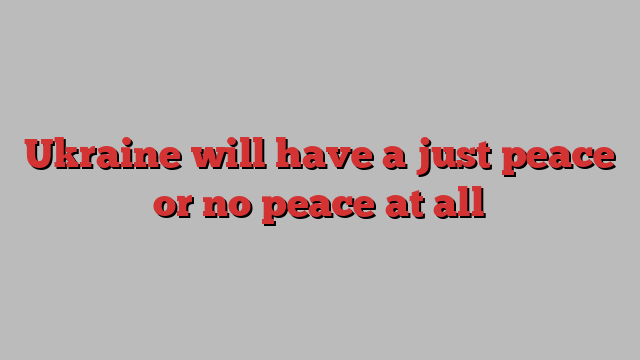
Unlock the Editor’s Digest for free
Roula Khalaf, Editor of the FT, selects her favourite stories in this weekly newsletter.
The prospect of Donald Trump’s return to the White House and his nomination of JD Vance, a hardline isolationist, as his running mate have raised the difficult question of what price is it worth paying to bring peace to Ukraine. Trump has boasted, ludicrously, that he could end Vladimir Putin’s brutal war of aggression against Ukraine overnight, without explaining how. Former Trump advisers have sketched out flimsy plans for a ceasefire in return for territorial concessions. Hungarian premier Viktor Orbán, Europe’s appeaser in chief, went on a self-appointed “peace mission” to Kyiv, the Kremlin and Mar-a-Lago, Trump’s Florida redoubt.
Ukraine too has stepped up its efforts to try to set the terms of a just peace. On present levels of military support from its allies — and denied permission to use long-range weaponry to degrade Putin’s war machine in Russia itself — Kyiv has no realistic military path to liberating all its lands. Fatigue is growing. Millions of Ukrainians face a cold, dark winter after Russian missiles pulverised half of the country’s power supply. Recent polling suggests a large minority of Ukrainians now favour peace negotiations, with growing numbers even willing to contemplate territorial concessions to buy peace.
Ukrainian President Volodymyr Zelenskyy has proposed holding another multilateral peace conference before the US election to which Russia would be invited. His foreign minister has just visited China, Russia’s most important backer in diplomatic and material terms. Ultimately, it has to be for Kyiv to decide when to negotiate an end to the war. For the moment, though, the chances of a successful peace process look slim. Ukraine wants restoration of its territorial integrity and sovereignty; Moscow wants Ukraine’s subjugation as well as full control of four of its provinces. These positions are irreconcilable and neither side has the military upper hand to compel the other to concede.
Forcing Ukraine into an unfavourable settlement through threats to withhold further military aid, as some Trump supporters propose, would be a disaster not just for the country but for European security and for the west.
To be sure, victory for Ukraine cannot only be defined by the full and immediate restoration of its 1991 borders. Becoming a prosperous democracy embedded in the EU and free from Moscow’s tutelage even with its lands partly occupied would be a tremendous success. Ukrainian negotiators appeared ready to agree to such a deal in the weeks after Russia’s full-scale invasion.
But after 29 months of aggression, many Ukrainians understandably view trading land for peace as a false prospectus. Putin’s objectives are not territorial but imperial. He wants to end Ukraine as an independent nation. It would be the height of naivety to think that the Russian leader will negotiate in good faith or keep whatever promises he makes. Rewarding his aggression will encourage further aggression — and embolden Russia’s allies in Beijing.
For Kyiv to accept any deal — and for it to stick — its allies would have to offer meaningful security guarantees that would dwarf the support they have provided so far. Are they ready to do so? Given the hesitation in Washington and other capitals over arming Ukraine during the past two and a half years, promises of further weaponry will not suffice.
Ukraine will be in a better position next year to go on the offensive, and improve its negotiating position. Indeed, Kyiv’s friends must maintain the resolve to tilt the war more to Ukraine’s advantage. This is especially true of the Europeans who risk becoming bystanders to an unjust settlement that seriously jeopardises their own security. They must increase their support and throw their weight behind Ukraine’s efforts to seek a just peace. Putin will only agree to one when he has no alternative.